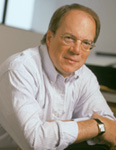
Vol. 75, No. 3, March
2002
Space, Time, and Our Freedom
by George C. Brown,
State Bar executive director
 I AM OVERWHELMED BY A SENSE OF HISTORY.
I AM OVERWHELMED BY A SENSE OF HISTORY.
Between meetings at the ABA Mid-Year Meeting in Philadelphia, I
walked from my hotel to the Old City neighborhood. At Independence Hall,
I stood in the hallways and rooms where the voices of Adams, Jefferson,
Madison, and all our nation's founders still echoed with their debates
about their future and ours. In that hallowed hall stands the chair
where Washington sat as president of the Constitutional Convention. It
was upon this chair that Franklin stated at the convention's end that,
throughout the debates, he had often wondered whether the gilded half
sun on the chair back was a rising or a setting sun and that he now knew
it was a rising sun. Next door, I viewed the printed copy of the
Declaration of Independence from which Col. Nixon read aloud for the
first time anywhere to throngs of colonists in July 1776 the reasons for
breaking away from England, and studied Elbridge Gerry's notated copy of
the Articles of Confederation and George Washington's printed copy of
the draft U.S. Constitution with his handwritten corrections. Inside the
old Pennsylvania State House, I stood in the Senate chamber where
Washington took the oath to begin his second term and where both Adams
and Jefferson took their oaths as vice president and then, finally, in
the House of Representatives chamber where Adams took the oath as
president. From this chamber, Adams walked outside to greet the cheers
of thousands. He was followed by Vice President Jefferson, who had just
asked Washington if, as former president, he wished to follow next
behind President Adams, to which Washington replied, "No, you are the
vice president, I am just a private citizen."
These seminal events took place in just a few thousand square feet of
space. I walked past the sites of revolutionary financier Robert
Morris's house, Dr. Benjamin Rush's house, and where the first
Presbyterian organization was founded in the United States. I passed
Christ Church where Declaration of Independence signer James Wilson and
many others are buried, and finally lingered at Franklin's grave to
wonder at his life and contributions.
Turning the corner, I saw the steeple and front façade of
Independence Hall just two blocks away. That is when I became
overwhelmed. I looked back and forth between the Hall and the graveyard.
Franklin and so many others actually walked these streets. Time and
space merged as did my head and my heart. The foundations of our laws
and our institutions were laid in these few square blocks.
This very personal experience had been building throughout the
previous few days as I heard about the heroic efforts of the leadership
and the staffs of the New York City, New York County, New York State,
and District of Columbia bar associations to help their members and
their staffs recover from the Sept. 11 attacks. And it resulted from
listening to Justice Anthony Kennedy describe a new educational outreach
program he is calling "Dialogue on Freedom." Sponsored by the ABA, the
program calls upon lawyers to engage in a personal dialogue with school
students on the nature and meaning of our nation and freedom in response
to the Sept. 11 attacks. (See President
Mowris's column.)
If we are to remain a nation of laws we all must gain a deeper
understanding of these things and help others to do the same.
Wisconsin Lawyer
